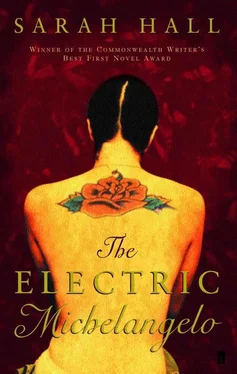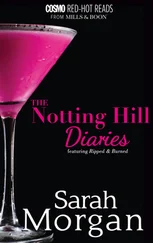Sarah Hall - The Electric Michelangelo
Здесь есть возможность читать онлайн «Sarah Hall - The Electric Michelangelo» весь текст электронной книги совершенно бесплатно (целиком полную версию без сокращений). В некоторых случаях можно слушать аудио, скачать через торрент в формате fb2 и присутствует краткое содержание. Год выпуска: 2010, Издательство: Faber and Faber, Жанр: Современная проза, на английском языке. Описание произведения, (предисловие) а так же отзывы посетителей доступны на портале библиотеки ЛибКат.
- Название:The Electric Michelangelo
- Автор:
- Издательство:Faber and Faber
- Жанр:
- Год:2010
- ISBN:нет данных
- Рейтинг книги:3 / 5. Голосов: 1
-
Избранное:Добавить в избранное
- Отзывы:
-
Ваша оценка:
- 60
- 1
- 2
- 3
- 4
- 5
The Electric Michelangelo: краткое содержание, описание и аннотация
Предлагаем к чтению аннотацию, описание, краткое содержание или предисловие (зависит от того, что написал сам автор книги «The Electric Michelangelo»). Если вы не нашли необходимую информацию о книге — напишите в комментариях, мы постараемся отыскать её.
The Electric Michelangelo — читать онлайн бесплатно полную книгу (весь текст) целиком
Ниже представлен текст книги, разбитый по страницам. Система сохранения места последней прочитанной страницы, позволяет с удобством читать онлайн бесплатно книгу «The Electric Michelangelo», без необходимости каждый раз заново искать на чём Вы остановились. Поставьте закладку, и сможете в любой момент перейти на страницу, на которой закончили чтение.
Интервал:
Закладка:
The quicksands of Morecambe Bay took the lives of a few unsuspecting beach-explorers and visitors every decade or so. They lay out to the south-west, beyond the town itself, and when the tide went out they formed in a quiet, saturated strip that could pull down and swallow a whole adult body in fifteen minutes or less, like an egg in the muscular throat of a snake. Once swallowed, bones could crack like the egg’s shell under pressure and the body cavities would be invaded by thick wet juice. The heavier the victim, the quicker the death was how it went. The beach was a fateful combination of rock, pebble, river-borne silt and mud hollows, which could create vertical sand tunnels and crusted-edged bowls of considerable depth. A nasty liquid conspiracy between trickling eddies and the ebbing tide resulted in some of the worst and most dangerous traps on the whole of the British coastline. When a tourist was lost, or a local went missing, the first place the police constables looked for them after Moss Street was south-west of the harbour beach. Local guides would bring the uniformed men out on to the perimeter of the quicksands to assess the possibility of those ravenous hydra sand-mouths having claimed another victim. Drunks had a habit of challenging the quicksands when they were losing at life. And they would lose again, lose their last rum-reeky breath, and complete their demise. Sometimes the sucking holes were not that deep, they were deep enough to kill and drown and crush but not to consume fully, Morecambe Bay itself being partial to a little comedy, it would seem. And a hand or a whole arm would protrude from the surface as if waving to the search party, as if the sand predator had eyes that were bigger than its belly. Immune only were the dirty, grey, juvenile swans that waddled out flat-webbed over the mouths of the beast in search of worms and flapped extraordinarily powerful wings to lift out of the grip at the slightest indication that the ground was beginning to take them.
The younger children of the town occasionally played a game called quicksand in the school playground, where the pretended execution of one of them was always tragically improvised. Some of the older, bolder children from the town formed lines out on the beach during holidays or weekends and the bravest of them all would step out into the treacherous jaws of living sand until the pull began to frighten them, then they would yell and get heaved back to safety, out on to the dry, stable, trustworthy beach. Almost before the children of Morecambe could understand the English language their parents told them about the perils of quicksand. How, if caught, they should remain absolutely still and not struggle, that made it worse you see, just scream for help, scream and scream until rescue came. And they were taken out across the vast, empty, sealess beach at low tide and shown that portion of the shore they must not venture on to, where there were shiny looking patches of smooth sand, which differed slightly from their surrounding canvas. Scream and scream for help, the parents said.
But every so often a child from Morecambe would actually wander out on the beach at low tide where they should not go, perhaps collecting shells or rock-pooling, perhaps under the spell of the brewing fog that rolled in from time to time, and they would step through a patch of live sand and not step out again, and they would struggle because it is human nature to fight for life when it is being taken, and nobody would hear the screams and come to help even though it had been promised. Only the cold, disdainful Irish Sea would hear the calls and come up to investigate, that fickle arm of the Atlantic Ocean which had in part set up the trap. In it would rush and smooth over the strange, lumpy, depressed portion of beach with the wet scuffled tracks and the trenched handprints. Smoothing it over like glass, as if complicit in the murder, as if further employed in the conspiracy to get rid of the evidence. And the child would join the company of a few others inside the tightest, sludgiest, densest of bellies. And crack like an egg the child would go, and thick wet sand would seep into his mouth and ears, setting him in the last position his limbs could move into. And out would come the search parties and the guides and the police when little Charlie didn’t come home at teatime. A scarf would eventually be found, or a glove, a shoe, a fishing net, too light to be a decent meal for the hungry sand and so it was left above ground, moved around by the sea, and brought up to the piers by the police sergeant to be recognized by a now hysterical mother. Then the game in the school playground would start up again in earnest and the shrieks of panicking children would echo over to Charlie Jessop’s house on Royal Street, where his mother would be looking at a photograph of her son, whom the wretched Morecambe quicksand had made eternally seven years old.

Cyril Parks had been up to his crotch in it before, with Jonty and Morris holding his outstretched arms. The theory was that since he was the tallest of the three there would be more of him to get pulled down, and more of him left sticking out to grab hold of and yank back out. Height was a surprisingly versatile argument for being the first to undertake experimental practices, Cy noticed.
— Go on, Parksie, those great long legs will hit the bottom before you drown.
— Aye. We’ll not wander off and leave you.
It was amusing up over the ankles, sort of tickling and soft. Cy laughed to his friends and said that it was grand. But then the sand began to work faster and after a few seconds his knees were gone and it was not soft any more, it was cold and wet, like a big, pillowy tongue up his trouser legs. It was nasty. There was an unmistakable feeling of being swallowed. Sucked on like a lollipop, like the bigger boys said Lucy Willacy, the headmaster’s daughter, had done to their dickies but not as nice, he assumed.
— What’s it like now?
As ever, Morris and Jonty were keen to know the exact details of the experience. Cy didn’t reply. It was like being buried, he thought. Like swimming in Lyle’s Golden Syrup. Like amputation of his legs so that he suddenly felt shorter, a good deal smaller, and he could not say with certainty that he had toes any more. He got to just past his knees and said to his friends enough and to pull him out. So they tried pulling. But he kept going down, he did not start coming up. The sand had opened its monstrous gullet and begun its gurgitation. Mid-thigh now, he lost his balance, swayed, but was unable to adjust the position of his legs and he tipped over to one side. His left hand was caught by the sand and sucked on. He dragged it out, covered in a new, gluey brown skin.
Then panic, panic, panic was all Cy felt, getting quicker in him and bigger. He was stuck. Too stuck. He was being eaten. Jonty and Morris had him by the shoulders and arms and were jerking at him but he was still going down. He tried to talk and started stumbling over bits of speech, rambling about nothing.
— Mam’s cutlery … she’ll bust us over the chops … I … I… want to go, come back, Dad … Lu, Lu, Lucy, then if I don’t … of God, oh God … Ah, ah …
And the ranting was replaced by yelling. He was low enough to feel the compression of sand on the end of his dicky and it was not a marvellous sensation in the slightest. He was now half-wearing the beach.
Morris Gibbs bent suddenly and put a hand over Cy’s mouth.
— Shut up, you idiot. Undo your trews. Quick sharp, eh.
— What? It’s not funny Morris, it’s not –
— Aye, go on and do it. No time to explain. Cy … Cyril. It’s all right.
Cy fumbled with his buttons and pulled his breeches down until they met the wet sand.
Читать дальшеИнтервал:
Закладка:
Похожие книги на «The Electric Michelangelo»
Представляем Вашему вниманию похожие книги на «The Electric Michelangelo» списком для выбора. Мы отобрали схожую по названию и смыслу литературу в надежде предоставить читателям больше вариантов отыскать новые, интересные, ещё непрочитанные произведения.
Обсуждение, отзывы о книге «The Electric Michelangelo» и просто собственные мнения читателей. Оставьте ваши комментарии, напишите, что Вы думаете о произведении, его смысле или главных героях. Укажите что конкретно понравилось, а что нет, и почему Вы так считаете.












